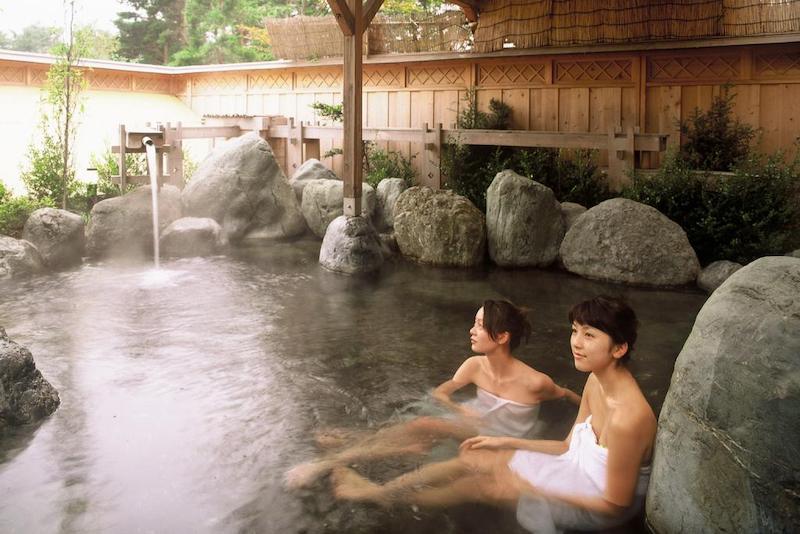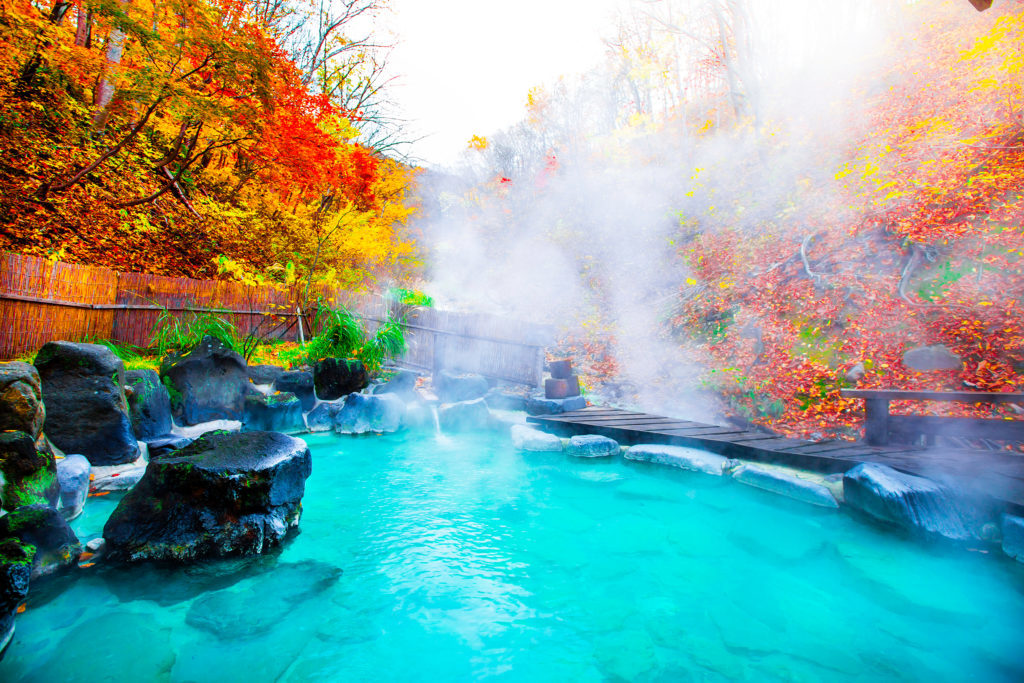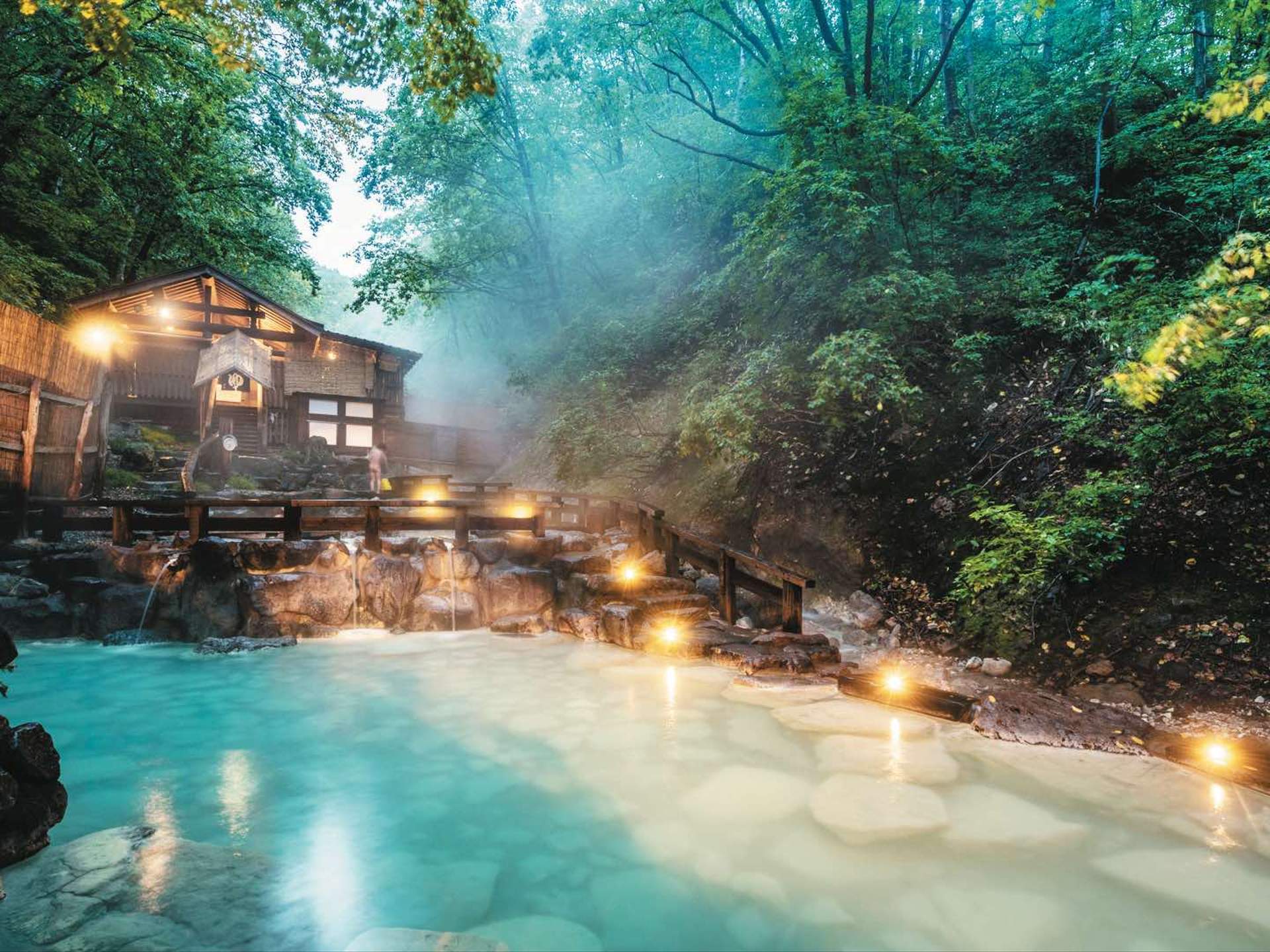Japan is known for its creativity and technology, but it is also firmly steeped in its culture and customs along with Japan Onsen. Almost everything has a ritual, including eating, taking a bath, and sipping tea. And if some R&R is on your itinerary, Japanese onsens are a must-visit for bathing. However, go through our pocket guide to Japan Onsen and the protocol to be followed there before making your reservation.
Onsens, which date back to the seventh century, are mentioned in the Kojiki, the oldest Japanese scriptures. Legend has it that the fabled deity Izanagi washed himself with hot water after emerging from the underworld. The first onsen, a symbol of purity and spiritual renewal, is claimed to have been created as a result of this act of cleansing.
What are Japan Onsen?
A natural spa with spring water that has been geothermally heated is referred to as a “hot spring” in Japan by the word onsen. The water in an onsen should be at least 25°C and include at least one of the 19 distinct compounds that naturally occur in spring water.
The Nippon Japan Onsen Research Institute estimates that there are roughly 3000 onsens in Japan.
Onsen towns include locales like Kusatsu (Gunma Prefecture), Hakone (Kanagawa Prefecture), Kurokawa (Oita Prefecture), and Noboribetsu (Hokkaido Prefecture) among others.

Meaning of an onsen
Onsens are relaxation and meditation centres in Japan. The onsen water has several health advantages since it contains natural minerals.
Additionally, as the entire experience is meant to be therapeutic and curing, these bathhouses adhere to a particular set of implicit norms or etiquettes that visitors must be aware of before to going. You must behave properly in an Japan Onsen, regardless of whether it is housed in a traditional rokyan in a charming and serene Japanese town, tucked away in the mountains amidst lovely surroundings, or is a part of a resort. The set of regulations might be relaxed for people who opt for a private onsen next to their accommodation.
Different Onsens
Onsens come in two main varieties: roten-buro (outdoor baths) and noten-buro (indoor baths). They can be found alone or as a component of extravagant resorts, opulent hotels, and Japanese inns (ryokan).
Onsens and sentos are commonly confused, although they are two different things. Sentos are open-air public bathhouses with a supply of water that is typically heated, as opposed to Japan Onsen, which have a supply of naturally mineral-rich spring water.
Onsen manners to observe before visiting

Shower well before entering the water.
A decent wash with soap and shampoo and thorough cleanliness are two of the first and most important Japan Onsen requirements. Before accessing the communal area with hot spring water, a person must be completely clean according to Japanese tradition.
Do not submerge your towel in water.
Visitors are not even permitted to immerse their towels in the water since, as was previously explained, clothing is seen as dirty. However, they may wear a little one when half submerged and carry a larger one to shield their delicate body parts.
Be in a neck-deep position at all times.
Don’t immerse yourself entirely in the water since it has to be clear of germs from your mouth and hair strands. Even if you recently shampooed your hair, you must still do this Japan Onsen.
Take a swim sans attire or a swimsuit.
Since garments are deemed filthy, this restriction may be a little daunting for some people who aren’t used to communal or public bathing facilities. If going makes you uncomfortable, you can opt out or schedule a private session.
Put a decent hair tie on.
Visitors must tie their hair back to prevent strands, shampoo residue or any other hair-related debris from clogging the bathroom.
Please, no tattoos.
Attention, tattoo enthusiasts. It’s possible that visitors with highly noticeable tattoos won’t be permitted to swim. However, certain Japan Onsen may permit people with extremely minor tattoos or those who have taped over their tattoos to match their skin tone. You may also reserve a room with a private onsen, go to the public area after everyone has left, or pick a private session. The good news is that certain establishments, including Shima Onsen Kashiwaya Ryokan, welcome tattoos.
Avoid being excessively talkative or noisy.
Onsens may be open spaces where individuals can engage in casual conversation with friends or family, but they should keep their voices down and speak very little as they are only there to rest and unwind.

No cellphones there
Before entering the bath, visitors are not permitted to bring their phones to the shower area since taking photographs is absolutely forbidden. The locker room is where they may store their phone and other personal items in Japan Onsen.
Anything alcoholic or otherwise
You should be aware that drinking wine while in the water is not permitted in public baths if you have any plans to do so. This might not be the case within a personal one, though. Additionally, it should be emphasised that due to the warmth of the water, those who are inebriated shouldn’t immerse themselves.



